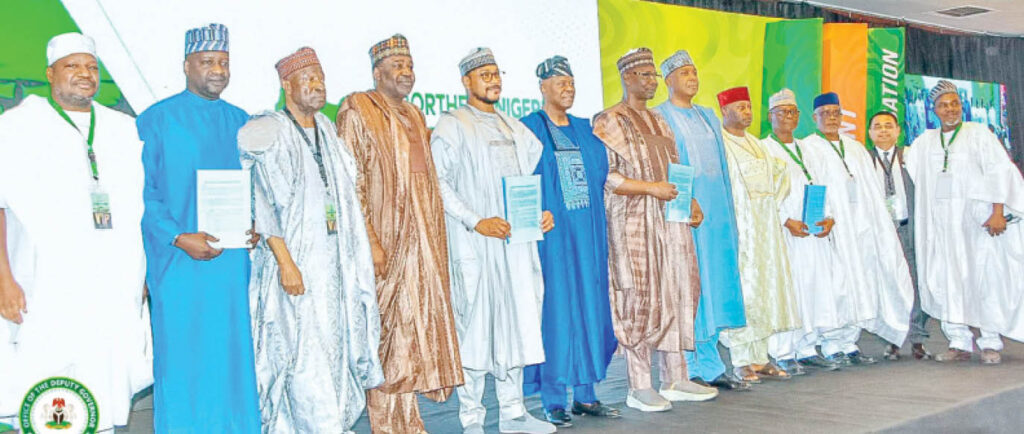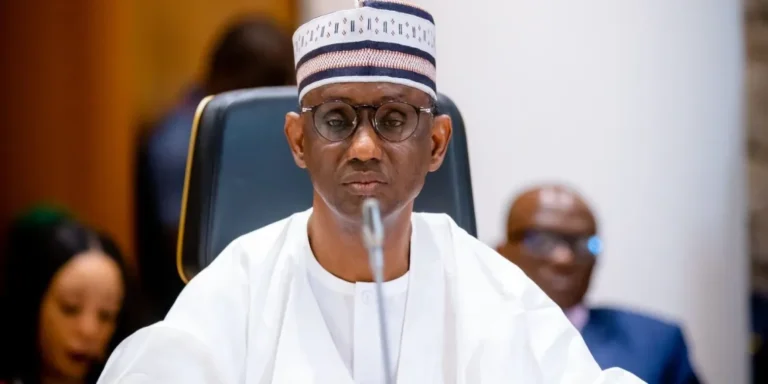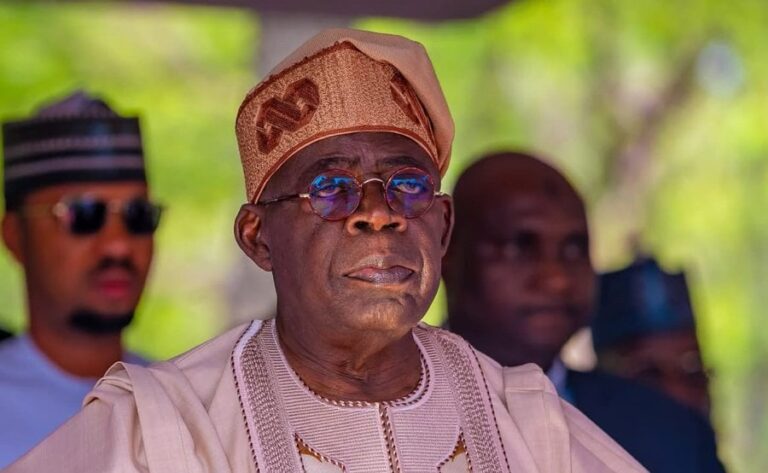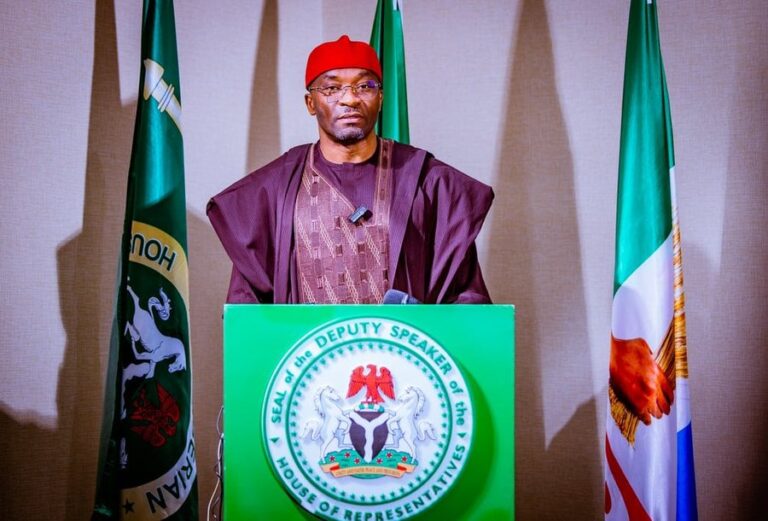
Northern leaders and governors from the region have called for a united front to address the region’s security and economic challenges.
They spoke in Abuja Monday during the Northern Nigeria Investment and Industrialisation Summit (NNIIS) 2025 themed ‘Unlocking Northern Nigeria’s Mining, Agricultural and Power Potentials (MAP2035)’. The event was called at the instance of the Northern Elders Forum (NEF).
MAP2035, according to the Northern Elders Forum (NEF), is a 10-year blueprint for transformation, a framework designed to reposition Northern Nigeria as a hub of innovation, industrialisation and inclusive growth.
For over a decade, the region has been beset by banditry, insurgency, farmer-herder clashes, and kidnappings.
Speaking during the summit, the governors of Zamfara, Nasarawa and Gombe states said fragmented responses had weakened the region’s bargaining power and delayed progress.
They called for a unified front to tackle the insecurity and drive economic transformation across the region.
They underscored a shared commitment to collaborative action, infrastructure development and policy reform aimed at unlocking the North’s vast potentials in mining, agriculture and power.
Governor Dauda Lawal of Zamfara State noted that security is the bedrock of development. He said: “Investors, both domestic and international, are not philanthropists; they are realists. They will not commit capital where it is not safe.”
He called for deeper collaboration among the 19 northern states, including integrated security architecture and real-time intelligence sharing, to create a predictable environment for investment.
Lawal also proposed a Northern Nigerian Economic Compact to unify efforts on security and economic matters, co-invest in infrastructure and present a single window for major investors.
Governor Abdullahi Sule of Nasarawa State highlighted the unprecedented revenue available to subnational governments, urging leaders to channel these resources into transformative sectors.
“Every state now has the resources to secure its people. We should stop blaming anybody for our security. If we are blaming anybody, blame ourselves,” he said.
Sule also showcased Nasarawa’s strides in formalising the mining sector and expanding agricultural production, reinforcing the importance of leveraging local strengths for regional growth.
Governor Inuwa Yahaya of Gombe State, who chairs the Northern Governors’ Forum (NGF), stressed that poor infrastructure remains a major barrier to economic progress.
“We are blessed with mineral wealth, fertile land, and vibrant human capital, but without railways, roads, power, and storage, the full value cannot be realised,” he said.
Yahaya called for reforms in project financing to ensure Northern entrepreneurs can access credit using local assets, describing current collateral practices as “exclusionary.”
Meanwhile, today (Tuesday) marks the second and final day of the summit, during which the Northern Elders Forum (NEF) is expected to consolidate inputs from various speakers and release a formal communiqué.
North catalyst for Nigeria’s progress – Tinubu
President Bola Ahmed Tinubu, who was represented at the summit by the Minister of Finance and Coordinating Minister for the Economy, Wale Edun, noted that Nigeria’s prosperity is inseparable from the future of the North.
He said his administration was currently embarking on critical industrialisation projects for northern Nigeria.
He also commended the Northern Elders Forum for the determination to change the narrative and position the region in its rightful place as it used to be.
He said, “The future of Nigeria’s prosperity is inseparable from the future of northern Nigeria. If we unlock the North’s minerals, we secure a new era of industrial competitiveness. If we unlock the North’s agriculture, we guarantee food security and global export leadership. If we unlock the North’s power, we ignite a wave of industrialisation that will employ millions of Nigerians.”
The president said his economic vision was to build a strong, stable and inclusive economy where the government clears obstacles out of the way, where the private sector provides the engine of growth and where every Nigerian can rise.
He said: “The North is not just a part of the country; it is the engine of the country. So, together, let us seize this moment to transform northern Nigeria into the powerhouse of Nigeria’s prosperity.
“I warmly commend the Northern Elders Forum, the 19 states of Northern Nigeria, for convening this historic summit. The theme, ‘Unlocking Strategic Opportunities in Mining, Agriculture and Power’, MAP for short, could not be more fitting because these sectors do represent the backbone of Nigeria’s economy and indeed the foundation for industrialisation.
“In the second quarter of 2025, that’s just this last quarter, April to June, the GDP of Nigeria grew by 4.23%, the strongest growth in a decade except for the COVID rebound era. The strongest growth in a decade, and since 2023, year-on-year growth has consistently been above three per cent, outpacing two per cent of the five to eight years previously.
“More critically, industrial growth, where jobs are created, doubled year-on-year, while agriculture and services also expanded robustly. Inflation has begun to ease, 20.12 per cent in August, and it’s consistently, month after month, the last five months have been coming down.
“Our trade surplus, $7.4 trillion, reserves risen to $42 billion, and as we know, the Naira has not only stabilized, it has even strengthened but this progress is not by chance it is a result of deliberate, intentional, and strategic policies anchored on the President’s Renewed Hope Agenda. The Renewed Hope Agenda is anchored on economic transformation, inclusive growth, and national prosperity but it recognizes the interconnected roles of finance, public policy, technology, in unlocking Nigeria’s full potential.
“The key focus areas have been stabilising the macroeconomic environment, creating jobs, reducing poverty, mobilising private sector investment, whether domestic, and focused on digital and financial innovation.
“And that’s why the president’s administration’s strategic reforms place mining, agriculture, and power in the North at the heart of our growth agenda. What are those opportunities? As we have just heard, the North holds some of the most valuable mineral deposits in Africa. Gold, lithium, tin, zinc, limestone, coal are all available in the North, and new reforms are formalising artisanal mining, attracting credible investors, as we have heard earlier today in lithium, for example, and ensuring that host communities benefit directly.
“And that is critical, ensuring that host communities benefit directly, thereby avoiding some of the problems that can come from when host communities feel left out.
“So we are building value chains so Nigeria no longer just exports raw materials, but also processes those raw materials into batteries, cement, industrial inputs. Let me turn to agriculture.
“With 70% of Nigeria’s arable land located in the North, agriculture is both the region’s heritage and its future, and key to unlocking that agricultural potential is really the world. It’s things like the infrastructure that was referred to by the Chairman.
“Key infrastructure, such as the Sokoto-Badagry Highway, that will link so many states and their dams and their ability to provide irrigation, as well as link it all the way down to the South, all the way down to the ports. It’s that kind of transformational infrastructural development that is being undertaken under Mr. President’s Review of Hope agenda.
“And these are the things that are being done differently that give us tremendous optimism that at last some of the discussions which the Nigerian Economic Summit Group was undertaking in the 90s are now coming to fruition. The goal is to build agro-industrial corridors where crops, they don’t just feed the market, but they supply flour mills, textile factories, and export hubs.”
Meanwhile, speaking on efforts on energy revolution for North’s industrialisation to attract investors, the president maintained that the Ajaokuta Kaduna Kano (AKK) Pipeline project when completed will make the region an industrial hub.
“Looking at power and industrialisation, energy, of course, is the oxygen of industrialisation. Without power, there can be no factories, no agro-processing, and no jobs at scale, which is what Nigeria needs. Of course, we now have the Ministry of Livestock Development, and that’s an important innovation that retains great value. But in terms of going back to power, we do have the Ajaokuta Kaduna Kano, AKK, Pipeline, and that is a strategic project
“And it is almost completed, it will deliver natural gas for power generation and industrial use across the whole of northern Nigeria, and coupled with the Mission 300, which, as I said earlier, is unlocking about $32 billion in energy and industrial investment, we are laying the foundation for a northern Nigeria that is fully powered and industrialised.
“Imagine a northern Nigeria where textiles in Kaduna, cement in Sokoto, fertilizer in Bauchi, agro-processing in Kano, and mining in Zamfara, are all powered by reliable and affordable energy.”
Poor infrastructure impeding North’s industrialisation – NEF
Chairman, Northern Elders Forum, Prof. Ango Abdullahi, represented by retired Air-Marshal Al’amin Daggash (rtd.), in his welcome address, said the lack of critical infrastructure was impeding industrialisation in the region.
He said the summit was neither political nor ceremonial, but a mission for prosperity, a rallying call to action and a decisive step towards building a sustainable economic future for Northern Nigeria.
He said: “We cannot delay any further. The resources are here, the people are ready, and the time is now. Let us be clear: if the North rises, Nigeria rises. If Nigeria rises, Africa rises. This summit marks the beginning of a decade-long journey. The North must walk it with determination, unity and vision.
“The backbone of Northern Nigeria’s economy, from colonial times through the early years of independence, was agriculture and an extensive network of rail lines. These facilitated the movement of groundnuts, cotton, hides and skins, and solid minerals to the coastal states—predominantly Lagos—for export.
“That legacy demonstrates two enduring realities: The North has always been the engine room of Nigeria’s productive economy. Our challenge has always been infrastructure to link our vast resources to markets.
“Today, those realities remain unchanged. Northern Nigeria is blessed with abundant mineral wealth, fertile land, and vibrant human capital. But without modern infrastructure—railways, roads, power, and storage—the full value of these resources cannot be realised. This explains the growing preoccupation of government agencies and stakeholders with exploiting our region’s tremendous mineral resources.
“Yet, as elders, we must stress: without corresponding infrastructure, these efforts will remain sub-optimal; we, as elders, strongly believe that for government policies to deliver meaningful impact, there must be deliberate commitment to the mining sector and its related services.
“Imagine the multiplier effect—industrial growth, job creation, poverty reduction, and renewed prosperity for our people—if mining is properly harnessed, linked to value chains, and supported by strong infrastructure.”
Abdullahi called for favourable financial inclusion of northern entrepreneurs in project financing.
“We must express our continuous concern that unless the government and financial sector review their policies, businesses based in Northern Nigeria will remain disadvantaged. The current practice where entrepreneurs can only access substantial credit if they hold properties in Lagos or Port Harcourt is unjust and exclusionary”, he said.
We must speak with one voice – Zamfara gov
Governor Dauda Lawal of Zamfara State stressed the need for the governors in the 19 northern states to speak with one voice on security and economic matters. According to him, a safe North is a bankable North.
“By convening this gathering under the theme ‘Unlocking Strategic Opportunities,’ you have once again demonstrated a clear-eyed focus on our collective future.
“The choice of sectors—Mining, Agriculture, and Power—is not accidental. It is a strategic diagnosis of the core pillars upon which the prosperity of Northern Nigeria must be built. In Zamfara, we are aware of the paradox we face: a land blessed with immense mineral wealth and vast arable land, yet our people have not fully reaped the dividends of these endowments.
“The key question for us as leaders is not what needs to be done, but how we can collectively turn potential into prosperity. To attract necessary investment and industrialise our region for the nation’s benefit, we must move beyond rhetoric and adopt a new approach of collaboration.
“We must collectively secure people and investments. Security is the fundamental prerequisite for any meaningful development. Investors, both domestic and international, are not philanthropists; they are realists. They will not commit capital where it is not safe. We must integrate our security architectures, share intelligence in real-time, and foster greater community policing to create a secure and predictable environment.
“In Zamfara, our commitment is clear. We are moving from a past of informality and illegality in the mining sector to a regime of formalisation, regulation, and value addition. We are revitalizing our agricultural sector by promoting mechanization, agro-processing, and access to credit. And we are creating the secure and stable environment that is the bedrock of it all.
“My call to action today is for a Northern Nigerian Economic Compact—a binding commitment among the 19 states to speak with one voice on security and economic matters. Create a Single Window for major investors looking to do business across the region. Co-invest in critical infrastructure like power, rail, and fibre optics that connect our states,” Lawal said.
States must channel their revenues into economic growth – Nasarawa gov
Abdullahi Sule, the governor of Nasarawa State, urged northern governors to focus on areas of comparative advantage, take responsibility for security and avoid a culture of blame.
“Every state now has the resources to secure its people. We should stop blaming anybody for our security. If we are blaming anybody, blame ourselves,” he said.
“For the first time in our history, all tiers of government are sharing more revenue than they ever imagined.
“Over N2.2 trillion was shared this month alone. When I became governor in 2019, we were sharing between N590 billion and N620 billion. Today, it is four times that amount,” he stated.
The governor said Nasarawa had leveraged reforms to insist that investors in solid minerals set up processing plants, leading to the commissioning of a 3,000-metric-tonne-per-day facility and the completion of another 6,000-tonne plant awaiting inauguration.
He also confirmed oil fields in the state with reserves estimated at five to seven million barrels, and outlined plans to expand rice cultivation from 3,300 hectares to as much as 8,000 hectares before the end of his tenure.
Gombe gov seeks infrastructure, credit reform for region
In his welcome address, Inuwa Yahaya, the governor of Gombe, said the region was historically Nigeria’s economic engine, but was being held back by poor infrastructure.
He said: “The backbone of Northern Nigeria’s economy from glorious times through the early years of independence was agriculture, supported by an extensive network of rail lines.
“Today, the realities remain unchanged. We are blessed with mineral wealth, fertile land, and vibrant human capital, but without railways, roads, power, and storage, the full value cannot be realised.”
Yahaya called for reforms in project financing to give northern entrepreneurs access to credit.
“The current practice where businesses can only qualify if they provide collateral outside their land and enterprises is exclusionary. Government and financial institutions must change this,” he said.
We can break poverty cycle with new thinking – Lamis Dikko
In his contribution to the conversation on the existential problems in the region, Lamis Shehu Dikko, who is the Chairman of the Northern Nigeria Development Company (NNDC), said the 19 northern states face deep socioeconomic challenges, with poverty rates exceeding 60%, and reaching over 80% in states like Zamfara and Sokoto, compared to about 30% in the South.
He said traditional development approaches have failed to reverse this trend, making a paradigm shift urgent.
Dikko said that the central argument is that embedding technology, digital infrastructure, and innovation into every sector of development is the only sustainable path to prosperity.
According to him, a critical first step is closing the digital divide as internet penetration in Nigeria stands at about 48%, but rural and northern regions lag far behind, leaving over 60 million Nigerians offline.
He said this risk excluding the North from the $15.7 trillion global AI-driven economy projected by 2030, and call for urgent steps to expand affordable broadband, smartphone access, and reliable electricity as an economic lifeline.
According to Dikko, “Agriculture remains the backbone of Northern Nigeria’s economy and livelihood but yields and incomes have long been limited by outdated practices. Embracing digital agriculture can change that. Imagine widely adopting precision farming tools – from drones and sensors that monitor soil and crop health, to AI-driven analysis of weather and satellite data guiding planting decisions. These technologies help farmers optimize fertilizer and water use, predict pests or droughts, and significantly boost crop yields and reduce losses.”
On electricity, he said, “Northern Nigeria’s development is crippled by energy poverty – an unreliable grid and low access to electricity in many communities. Technology offers a two-fold solution: modernize the grid and leapfrog with renewables. Investments in smart grid systems can improve efficiency in power distribution, reducing the rampant losses and outages.”
He added that realizing this transformation requires visionary leadership, supportive policies, and robust public-private partnerships. Regional cooperation, regulatory reforms, inclusive digital literacy programmes, and initiatives to empower women and rural communities are essential to prevent deepening inequality.
He added that organizations like the NNDC can catalyze investment and policy advocacy.
NACCIMA tasks northern govs on investor-friendly policies
In his goodwill message, Jani Ibrahim, the deputy president of the Nigerian Association of Chambers of Commerce, Industry, Mines and Agriculture (NACCIMA), said the summit’s focus was timely.
He urged the northern governors to adopt “transparent, investor-friendly policies, streamline regulatory processes, and guarantee security of life and property.”
“Mining, agriculture and power represent the most solid pillars upon which the economic revitalisation of northern Nigeria must rest,” Ibrahim said.
“However, unlocking these opportunities requires more than vision. It demands leadership and commitment at sub-national levels.”
The NACCIMA official also called for industrial clusters around mineral belts, investments in infrastructure, and partnerships to improve education and skills
DAILY TRUST.




